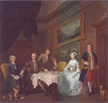Watercolour at Tate Britain invites you to challenge your preconceptions of what watercolour is. The most ambitious exhibition about watercolour ever to be staged, with works spanning 800 years, this boundary-breaking survey celebrates the full variety of ways watercolour has been used. From manuscripts, miniatures and maps through to works showing the expressive visual splendour of foreign landscapes, watercolour has always played a part in British Art.
John Martin + Heavy Metal Karaoke?
As part of the Great British Art Debate, each of the partner galleries has set up ‘tasters’ which aimed to ask their audience what they thought about art, and then use their opinions to help influence the way the big exhibitions are put together. Up at the Laing Art Gallery they decided to mix John Martin with heavy metal. Here’s Zoe Allen to explain how they got on . . .

Is the idea of British Art a British Fantasy?
We posed this and the other four key Great British Art Debate questions to our keen debate fiends over on facebook. Here are some of their thoughts:
What is British art? Is it art made by artists born in Britain? Because a lot of British artists live and work in Berlin or New York or in other places. Is art made by artists who live in Britain? A lot of those artists aren’t British by origin but they live here and produce work here. Is it a certain style of art, or art that deals with particularly British topics?
– AT, Facebook
Is art too popular?
We posed this and the other four key Great British Art Debate questions to our keen debate fiends over on facebook. Here are some of their thoughts:
When you say it like this it sounds like popularity is bad. Is that bad, and if so why? There’s been this idea for a long time that art shouldn’t be the same as television and pop music. Those things are too easy to digest whereas art is meant to be difficult, because if it’s difficult it forces you to think. Art should make us think, but is there a danger that it becomes inaccessible? Can art be both accessible and challenging?
– AB, Facebook
Does the art of the past say anything about the world of today?
We posed this and the other four key Great British Art Debate questions to our keen debate fiends over on facebook. Here are some of their thoughts:
I remember a version of this line being used by my history teacher backn in school – we need to learn about the past to understand the world of today… and yes, in a technical, academic sense this is true – the genesis of the values and ideas which shape our culture are a matter of historical investigation. But that is only one aspect of the way art can talk to the world of today; our own responses (what we like and don’t like) speak of today’s values, and I don’t think there’s any way around that. So thinking about the art of the past means keeping in play both these things – the historical record which the artwork is part of, which belongs to a bigger historical story which leads to today, and the way we respond to works themselves, and what that says about us.
– Martin Myrone, Tate Curator
Should the public have a say in what goes into museums?
We posed this and the other four key Great British Art Debate questions to our keen debate fiends over on facebook. Here are some of their thoughts:
Almost certainly not. There’s a false democracy which I suspect the present government is only going to push forward – which pretends that ‘everyone’ should have a say. Problem is, who feels like they have the right to speak? The big issue with museums and galleries is that not everyone feels comfortable going to them (and I speak from my own experience rather than a ‘museologist’ – the people who speak most on this matter and have the least to say). Think about the proposed ‘free schools’ – the idea that everyone can set up schools and shape them according to their own need sounds nice, but who are the people who have the economic and social confidence to get moving with a project like that… Toby Young, that’s who! Guess it’s a predictable answer from someone who gets paid for doing this, but I think that museums need a ‘professional class’ to manage them, and deliver stuff, but that this professional class need to be informed and aware and responsible, and that means politically self-conscious, about what we do. I’m not pretending that’s the case, though, at least from what I’ve seen…
– Martin Myrone, Tate Curator









What does art mean to you?
You can also join the debate on
Facebook
Twitter
Youtube